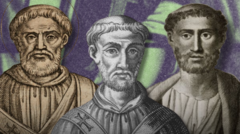North Africa, once a center for early Christianity, was home to three notable popes who shaped the Catholic Church's practices and cultural celebrations. As the Vatican prepares for a new pope, many African Catholics express hope for a return of the papacy to their continent after 1,500 years.
The Impact of African Popes on Christianity and Modern Celebrations

The Impact of African Popes on Christianity and Modern Celebrations
A look back at the contributions of North African popes to the evolution of Christianity and the establishment of holidays like Valentine's Day.
In a time when North Africa was a vibrant Christian hub, it produced three influential popes whose legacies continue to resonate within the Catholic Church today. Though the region is now predominantly Muslim, its historical significance as a cradle of Christianity is undeniable. Modern-day Catholic communities in Africa are hopeful that as a successor to Pope Francis is being chosen, the papacy could return to Africa for the first time in over 1,500 years.
The popes in question—Victor I, Miltiades, and Gelasius I—played pivotal roles in shaping Christian traditions. Victor I, serving from 189 to 199 AD, is best known for resolving the contentious debate over the celebration of Easter. By convening the first Roman Synod, he united diverse Christian practices, advocating for Easter to be celebrated on Sunday to align with the resurrection of Jesus. This decision marked a significant evolution in the liturgical calendar and established Latin as the Church's common language, moving away from Ancient Greek.
Pope Miltiades, who ruled from 311 to 314 AD, witnessed Christianity's rise to prominence in the Roman Empire, receiving significant support from Emperor Constantine, who granted him a palace and allowed for the construction of the Lateran Basilica, the oldest public church in Rome. While Miltiades did not influence this acceptance directly, his tenure heralded a new era for the Church.
The most prominent of the three, Gelasius I (492-496 AD), is remembered for coining the title “Vicar of Christ” and formulating the Doctrine of the Two Swords, which clarified the relationship between divine and earthly authorities. His efforts to unify the Christian Church also included the establishment of St. Valentine’s Day, commemorating the martyrdom of a priest who defied the emperor's marriage bans, showcasing the Church’s attempt to adapt pagan celebrations into Christian festivals.
Despite these contributions, it has been over 1,500 years since Gelasius I, and no pope has emerged from Africa since. This absence has been explained by factors like the decline of Christianity in North Africa following the fall of the Roman Empire and later Islamic conquests. However, scholars suggest the selection of popes has predominantly favored Italian candidates, creating what some call an “Italian monopoly” on the papacy.
Today, the Catholic community in Africa is thriving, with numbers significantly climbing in the southern hemisphere. Currently, three cardinal candidates from Africa are in the running to succeed Pope Francis, highlighting a transformative period for the Church. As Catholicism continues to grow in sub-Saharan Africa, many wonder if a new papacy from the continent may be on the horizon. Only time will tell if the next pope will emerge from Africa, reflecting the continent's deep-rooted connection to the early Church.
The popes in question—Victor I, Miltiades, and Gelasius I—played pivotal roles in shaping Christian traditions. Victor I, serving from 189 to 199 AD, is best known for resolving the contentious debate over the celebration of Easter. By convening the first Roman Synod, he united diverse Christian practices, advocating for Easter to be celebrated on Sunday to align with the resurrection of Jesus. This decision marked a significant evolution in the liturgical calendar and established Latin as the Church's common language, moving away from Ancient Greek.
Pope Miltiades, who ruled from 311 to 314 AD, witnessed Christianity's rise to prominence in the Roman Empire, receiving significant support from Emperor Constantine, who granted him a palace and allowed for the construction of the Lateran Basilica, the oldest public church in Rome. While Miltiades did not influence this acceptance directly, his tenure heralded a new era for the Church.
The most prominent of the three, Gelasius I (492-496 AD), is remembered for coining the title “Vicar of Christ” and formulating the Doctrine of the Two Swords, which clarified the relationship between divine and earthly authorities. His efforts to unify the Christian Church also included the establishment of St. Valentine’s Day, commemorating the martyrdom of a priest who defied the emperor's marriage bans, showcasing the Church’s attempt to adapt pagan celebrations into Christian festivals.
Despite these contributions, it has been over 1,500 years since Gelasius I, and no pope has emerged from Africa since. This absence has been explained by factors like the decline of Christianity in North Africa following the fall of the Roman Empire and later Islamic conquests. However, scholars suggest the selection of popes has predominantly favored Italian candidates, creating what some call an “Italian monopoly” on the papacy.
Today, the Catholic community in Africa is thriving, with numbers significantly climbing in the southern hemisphere. Currently, three cardinal candidates from Africa are in the running to succeed Pope Francis, highlighting a transformative period for the Church. As Catholicism continues to grow in sub-Saharan Africa, many wonder if a new papacy from the continent may be on the horizon. Only time will tell if the next pope will emerge from Africa, reflecting the continent's deep-rooted connection to the early Church.





















